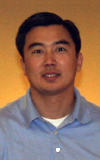 |
Shigeki Makino ’87
Former Chief Investment Officer
Putnam Investments Global Core Equity Fund
Brother “Shagg” Makino, as those who knew him back in the day, writes:
I graduated from the University of Chicago in 1990 with an MBA. At that time, I wrapped up my small investment management firm, Machtel, which I had started in college while at Psi U. Always had an avid interest in stocks since high school, and my MBA gave me an opportunity to pursue a career picking stocks with Fidelity Investments. So, I threw away the keys to my computer engineering degree from the U of I and my experience gained interning repeatedly at IBM and Andersen Consulting, and joined the Boston based firm.
Fido, as it is referred to, gave me a list of companies, a phone, and said, “have at it!” Luckily for me, I was given responsibility for Cisco, immediately after its IPO and Microsoft right after the launch of Windows 3.0, and the rest is history. A monkey would have gotten those stocks right, and I did. I wasn’t long for the US, and with a fiance already working in Japan, I successfully planned a wedding in Chicago, a honeymoon en-route to Tokyo where I began work as an analyst for Fidelity covering technology.
All the shine from Cisco and Microsoft lasted long enough to enable me to become a fund manager after three years, quite a short tenure for the vaunted leap to fund manager. I managed Fidelity’s first onshore mutual fund in 1995, but moved with Fido to Hong Kong in 1996. I went on to manage a top ranked Pacific Basin mutual fund while maintaining my Japan Fund duties. After the handover in Hong Kong, my family and I headed to London where I became Director of Research for European equities. There I coached and mentored about 50 analysts. Reuters named Fido’s European Research tops in Europe during my stay.
All along, I had aspirations to run global money, and in 2000, I returned to Boston with Putnam investments. In 2004, I became Chief Investment Officer for Global Core Equity where I am responsible for managing global equity portfolios.
The family and I enjoy traveling in search of history, culture, good food, and new experiences. We have been to roughly 70 countries in search of the above with Myanmar and Malawi two of our favorites. |
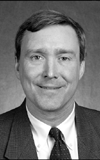 |
Larry Rakers ’86
Vice President and Portfolio Manager for Fidelity Investments
Brother Rakers is a vice president and portfolio manager for Fidelity Investments, the largest mutual fund company in the United States, the No. 1 provider of workplace retirement savings plans and a leading online brokerage firm. He manages Fidelity Balanced Fund, Fidelity Advisor Balanced Fund and VIP: Balanced Portfolio. In total, these funds have over $20 billion in assets. Brother Rakers notes, “I have managed the Fidelity Balanced Fund since Early 2002 and have done a pretty good job. I have beaten about 99% of my peers (as defined by Lipper). Morningstar gives the fund its highest rating (5 stars) and in an August 2006 issue of Baron’s I was mentioned in their listing of Top 100 Fund managers.”
Traditionally Fidelity has developed their diversified Fund managers by hiring graduates from business school and having them work as analysts and portfolio managers in a variety of different industries. This helps to explain his career path at Fidelity.
Mr. Rakers joined Fidelity as an equity research analyst in 1993, and followed the restaurant, precious metals and coal industries. Mr. Rakers managed Fidelity Select Gold Portfolio from 1995 to 1997 and managed Fidelity Select Precious Metals and Minerals Portfolio and Fidelity Select Paper and Forest Products Portfolio from 1996 to 1997. He managed Fidelity Select Energy Portfolio, Fidelity Select Natural Resources Portfolio and Fidelity Advisor Natural Resources Fund, and served as sector leader of Fidelity’s natural resources equity research group from 1997 to 1999. Mr. Rakers managed Fidelity Select Computers Portfolio and Fidelity Advisor Technology Portfolio from January 2000 and Fidelity Select Technology Portfolio from February 2000 until June 2001. He was also technology sector leader from January 2000 to June 2001. Mr. Rakers also managed Fidelity Convertible Securities Fund from June 2001 until February 2002, when he assumed management responsibility for Fidelity Balanced Fund. He began managing Fidelity Advisor Balanced Fund and VIP: Balanced Portfolio in June 2005.Before joining Fidelity, Mr. Rakers was a project engineer for Loral Corporation in Lexington, Massachusetts, from 1986 to 1993.
Born in 1963, Mr. Rakers received bachelor of science (Bronze Tablet) and master of science degrees in metallurgical engineering from the University of Illinois in 1985 and 1987 respectively. He also received an MBA from Northeastern University in 1993.
Brother Rakers also notes:
“Brother Shigeki Makino played an instrumental role in helping me get my first job at Fidelity. Shagg called me in May of 1990, looking for a place to stay during a summer internship he had at Fidelity. I was an engineer in the Boston area at the time (and happened to have an extra bedroom in my apartment). Shagg was fortunate enough to get the Communication equipment stocks as his summer assignment. He would come home late at night and tell me stories about working with Peter Lynch and other fund managers. His favorite stock at the time was Cisco Systems (which has appreciated 40x since then). It was pretty clear to me that Shagg had found a special career and a special place to work. Anyway he ended up getting a full time job at Fidelity and told me when I completed my MBA he would try to help me get an interview. Shagg did indeed help me get that first interview and I have tried to make the most of that good fortune.” |
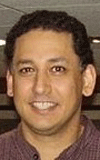 |
Michael Mikhail Ph.D. ’86
Associate Professor of Accountancy
Arizona State University – W.P. Carey School of Business
Brother Mikhail received his BS and MAS degrees from the University of Illinois at Urbana-Champaign and an MBA and Ph.D. from the University of Chicago. He previously taught at MIT’s Sloan School of Management where he was the inaugural holder of the Theodore T. Miller Chair and at Duke University’s Fuqua School of Business where he received the Executive MBA Program’s Excellence in Teaching Award.
Professor Mikhail’s research interests are in the use of financial information by capital market participants, primarily securities analysts. His work examines the forecast accuracy of securities analysts and explores the determinants of analysts’ forecasting ability, stock recommendation profitability, and the job consequences of poor performance. Professor Mikhail has also studied the effects of earnings quality on market participants’ reactions to other information provided by the firm and to the cost of capital. His research has appeared in the Journal of Accounting Research, The Accounting Review, the Journal of Accounting and Economics, the Journal of Financial Economics and the Journal of Accounting, Auditing and Finance.
He currently serves as a member of The Accounting Review’s Editorial Advisory and Review Board and as an ad-hoc reviewer for several other academic journals. Prior to becoming an academic, he was a Senior Consultant with Arthur Andersen’s Tax and Corporate Finance Practice in Chicago.
Professor Mikhail and his wife Sheila have a daughter in high school. |
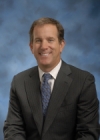 |
J. Eric Smith ’79
President and CEO
Swiss Re Americas
J. Eric Smith is the President and CEO of Swiss Re Americas, responsible for leading the company’s Property and Casualty (P&C) and Life and Health (L&H) reinsurance businesses in the US, Canada, Latin America and the Caribbean.
Prior to this, Brother Smith was President of USAA Life Insurance Company, a Fortune 250 financial services company located in San Antonio, TX. Eric joined USAA in January 2010 and oversees product development, strategic marketing and member service solutions for USAA’s Life Insurance Company. USAA Life Insurance Company, which has the highest ratings from A.M. Best and Standard & Poor’s, has $17.4 billion in assets under management and $306 billion in life insurance in force as of Dec. 31, 2009.
Prior to joining USAA, he was President of Allstate Financial Services, LLC, and was a member of the Allstate Financial Executive Committee. While at Allstate, Eric was responsible for the distribution of all financial products through the Allstate Agency channel, a $3.5B business, which was the largest within the Allstate Financial group.
Eric also spent more than 20 years with Country Insurance and Financial Services. His positions there included Corporate Vice President of Marketing, Regional Vice President of Agency, and Director of Agency Development.
Eric graduated with a degree in Finance and holds an MBA from Northwestern University’s Kellogg Graduate School of Business. He also holds the designations of Chartered Life Underwriter (CLU) and Chartered Financial consultant (ChFC) from the American College. Eric currently serves on the ACLI Executive Committee, and the GAMA executive leadership council. He is also a trustee of the American College.
|
 |
Michael W. Kanzler ’76
CFO
OPTIMA, inc.
|
 |
Marshall F. “Marsh” Smith ’51
President and Chief Operating Officer, Member of the Board of Directors – Indian Head, Inc.
President – TBG, U.S. Division
President and CEO – Commodore Computers
Brother Smith was the chief executive at Indian Head, Inc., a former textile firm which grew to be a conglomerate with diversified industrial holdings that included acontainers company, metal and automotive technology manufacturing plants, construction products and textile companies. Thyssen-Bornemisza Group N.V. (TBG, an international holdings company, purchased a controlling interest in the company, and Marshall became president of the U.S. division of TBG. He retired from TBG in 1986 and then served two years as president and chief executive officer of Commodore Computers.
During his career he served on several advisory boards, including the University of Illinois, Clarkson University School of Business, Manufacturers-Hanover Bank, and was appointed by President Ronald Reagan to the Board of the Young Astronauts Program.
Born in Chicago, Illinois Brother Smith took his degree in accounting from the U of I and later did graduate work at the University of Chicago and Northwestern Universities. Prior to taking the helm at Indian Head, he worked for the United States Steel Corporation for sixteen years, rising to Comptroller of the U.S. Steel Products Division.
During his undergraduate days, Brother Smith was an end for the football team, earning a varsity letter in 1948. Brother Gene McCarthy reports that “Mush” was a feared pass rusher and had pro potential before injuries pushed him in another direction. |
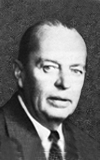 |
Frederick A. Nichols ’29
President and Director
Tribune Company
Brother Nichols, who began his career during the Depression selling classified advertising for the Chicago Tribune and rose to become president of Tribune Company – the only company he ever worked for. In the late 1940s and early 1950s, the legendary Colonel Robert McCormick assembled a team which was to lead the Tribune after his tenure, of which Brother Nichols was an integral part. He was influential in Tribune Co.’s acquisitions of newspapers in Ft. Lauderdale and Orlando, Florida, and in Van Nuys, California, and was chairman of the board for the Florida newspapers. On April 6, 1972, Mr. Nichols was elected president of Tribune Company by the board of directors, and he served in that job until December, 1974. He remained with the company as a member of the board of directors until he retired in 1977, when special tribute was paid to him at a stockholders’ meeting. “Fred Nichols was a man of great integrity who left his mark on Tribune Co. for years to come,†said Stanton R. Cook, president and chief executive officer of Tribune Co.
As Brother John Stewart ’69 remembers, “Fred Nichols was a great man who was a big help to the house, and as I remember, very down to earth and unassuming.†A native Chicagoan, Mr. Nichols attended Parker High School before attending the University of Illinois. He served at various times as president of the National Epilepsy League, trustee of the Illinois Children’s Home and Aid Society and trustee of the Robert R. McCormick Charitable Trust. |
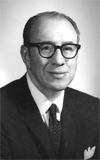 |
Rexford S. Blazer ’28
Chairman of the Board
Ashland Oil and Refining Company
Recipiant University of Illinois Alumni Achievement Award
Rex Blazer was Chairman of the Board – Ashland Oil and Refining Company, now known as the Ashland Inc., Founded in 1924 as a small eastern Kentucky refinery, Ashland Inc. has grown into a worldwide, multi-industry company. With sales and operating revenues of $9.3 billion in fiscal 2005, Ashland ranks among the nation’s top 500 companies based on revenues. In 1968, Brother Blazer was awarded the highest honor possible by the U of I Alumni Association, its Alumni Achievement Award, and like all illustrious winners of this honor, his portrait hangs in the Illini Union along its east corridor.
Blazer was the feature of a Time magazine feature from November of 1967 entitled Outworking the Competition
His church, says Rexford Blazer, 60, chairman of Ashland Oil & Refining Co., is convenient as well as a comfort. His company’s seven-story headquarters in the eastern Kentucky hill town of Ashland is directly across the street from Calvary Episcopal Church. On Sunday mornings, while other businessmen are still abed, Blazer works until church time, returns to his desk after services to work until dinnertime.
Blazer, along with President Orin Atkins, 43, and other Ashland executives, follows what is more or less jocularly called the “Ashland Workweek.” It begins around 8 a.m., lasts ordinarily until midnight, runs seven days a week with only occasional breaks and brief vacations. “I don’t think we’re any smarter than the competition,” explains Blazer, “but I think we outwork them.” As a result, in the past five years Ashland has almost tripled sales to $805 million. This week Ashland will regroup 13 small chemical companies acquired since 1963 into a subsidiary with $300 million in sales to be known as Ashland Chemical Co.
Expanding Backward
Even in a business with more mavericks than most, Ashland is a curious operation. Organized in 1924 by Paul Blazer, late uncle of the present chairman, it expanded backward. Rather than develop crude-oil supplies first and then build refineries and markets, Ashland built its markets in the south-central states, expanded its refineries as the markets grew. Ashland still buys most of its crude oil, hauls its purchases with its own barge fleet, one of the Ohio River’s largest, or by means of 5,000 miles of Ashland-owned pipeline. Critics accuse the company of being oil-shy, but Rexford Blazer denies the charge. “We have never run short one barrel of crude oil in our life,” says he, pointing out that Ashland currently receives 40,000 barrels a day more than it n eeds, sells the surplus to other refineries.
Founder Blazer kept his company flexible, bragged that an Ashland refinery could be converted from one kind of refining to another “by supper-time.” He also kept his work force lean, refused to hire his own nephew after Rex Blazer graduated from the University of Illinois (’28). “If you are as good as you think you are,” said Uncle Paul, “you won’t get any credit for it because you are my nephew. If you aren’t that good, I’ll have to fire you, and the family already has enough trouble.” Paul Blazer loaned his nephew $20 for one-way fare to Cleveland, where Rex got a job with Allied Oil Co. By the time that Allied was acquired by Ashland in 1948, Rex Blazer was its president. He succeeded his uncle as Ashland’s boss after the older Blazer retired in 1957.
Executive Fords
Since taking over, Blazer and Atkins have expanded with such acquisitions as United Carbon Co. of Houston, the O.K. Tire and Rubber Co., Valvoline Oil, the $96 million chemical operations of Archer Daniels Midland Co., and Warren Brothers Co. of Cambridge, Mass., the nation’s largest asphalt-paving company. Meanwhile, Ashland executives including the chairman continue to occupy modest offices and drive low-priced cars. Says Blazer proudly: “We have probably the only executive parking lot in the country filled only with Fords, Chevrolets and Plymouths.” Ashland’s finance committee has never met, there is no table of organization, and younger executives are simply too overworked to think up any make-work projects or write lengthy memorandums. The lone extravagance is a corporate jet that links isolated Ashland (pop. 32,700) with Wall Street and the world. |
 |
Alvord L. “Al” Boeck ’27
Professor and Director of the School of Business
Texas Christian University
The Omicron Arrow from April 1938 reports the following about Alvord L. “Al” Boeck ’27: ” We were glad to hear recently from Alvord L. “Al” Boeck ’27, who is professor and director of the School of Business Administration of Texas Christian University, Fort Worth, Texas. The Boeck home is located there at 2803 Greene Street. Besides taking work at the University, Brother Boeck attended Southern California, receiving his MA degree in 1930, and his Ph.D. degree in 1933, and Southwestern Law School from 1933-34. He is the author of “Economic Essentials of World Peace” published by the University of Southern California Press. Married, Al has a daughter, Mary Jean, six years old. Mrs. Boeck is a Tri-Delt from Southern California.”
Roger L Rainwater, the Special Collections Librarian at TCU’s Mary Couts Burnett Library, writes:
“In addition to being head of business school, Boeck was appointed Director of the Evening College in May, 1936, a position he held until 1942. In October, 1936, he was elected president of the Texas Association of University Instructors in Accounting. In 1939, he was appointed an advisor for the National Association of College and University Chambers of Commerce.
Boeck was elected vice president of the Association of Evening Colleges in 1940 and president of the same organization in 1941. He became a Chartered Life Underwriter in September, 1940.
In May of 1942 he was appointed principal price specialist of the Office of Price Administration in the regional office in Dallas, Texas. He resigned from the faculty at that time, although he was listed as ” on leave of absence” in September 1942. He did not return to TCU after the was and there were no other mentions of him after 1942.”
Information courtesy of TCU’s Mary Couts Burnett Library |
 |
Everett Wells ’26
President
Ashland Oil and Refining Company
No sooner did Brother Blazer take over the top spot at Ashland Oil, than Brother Everett Wells became his right hand man as the company’s president in 1957. Under the two of their leadership, Ashland continued its rise to the top of its industry. |
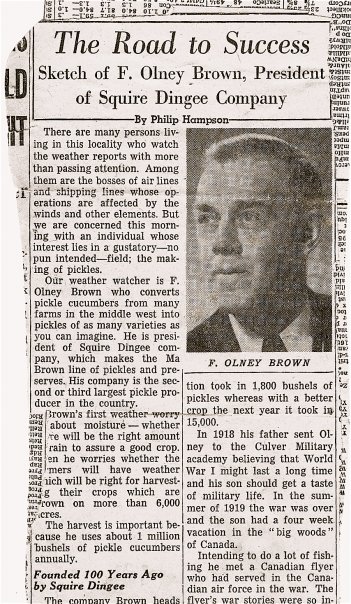 |
F. Olney “Ollie” Brown ’25
President
Squire Dingee Co.
A past President of the National Pickle Packers Association, Brother Brown was president of the Squire Dingee Co., which marketed Ma Brown pickles and preserves, when it was merged with Beatrice Foods in 1958. He remained a consultant with Beatrice Foods until 1965. Brother Brown was an avid booster of the chapter.
Brother Brown’s grand-daughter Cathy Brown Dougherty sends in the following clip from a newspaper:
“The Road to Success”
Sketch of F. Olney Brown, President of Squire Dingee Company
by Philip Hampson
There are many person living in this locality who watch the weather reports with more than passin gattention. Among them are the bosses of air lines and shipping lines whose operations are affected by winds and other elements. But we are concerned this morning with an individual whose interest lies in a gustatory-no pun intended-field; the making of pickles.
Our weather watcher is F. Olney Brown who converts pickle cucumbers from many farms in the middle west into pickles of as many varieties as you can imagine. He is president of Squire Dingee company, which makes the Ma Brown line of pickles and preserves. His company is the second or third largest pickles producer in the country.
Browns first weather worry is about moisture – weather there will be the right amount of rain to assure a good crop. Then he worries whether the farmers will have weather which will be right for harvesting their crops which are grown on more than 6,000 acres.
The harvest is important because he uses about 1 million bushels of pickle cucumbers annually.
Click here to download a larger image.
|
 |
Delmar L. Kroehler ’24
Chairman and Chief Executive Officer
Kroehler Manufacturing Company
In 1902, Peter E. Kroehler bought the Naperville Lounge Co., a maker of wooden lounge chairs and upholstered furniture. Kroehler built a new factory in Naperville in 1913 after the original facility was destroyed by a tornado. Soon thereafter, he renamed the company Kroehler Manufacturing Co. This enterprise soon operated across the country and employed several hundred men and women in the Chicago area. By the middle of the 1940s, with over $20 million in annual sales, Kroehler was the second-largest furniture maker in the United States.
Brother Kroehler joined the firm in 1922 as a mill machine operator, was named vice president of production in 1927 and became president upon his father’s illness in 1938. From 1951 until his retirement in 1967, he was chairman and chief executive officer of the company.
Kroehler became the world’s largest manufacturer of furniture specializing in upholstered furniture for the mass market. Its headquarters remained in Naperville, but plants were built throughout the country. During the 1960s, when the company employed close to 8,000 people around the country, annual revenues passed $100 million. The company struggled during the 1970s, closing its historic Naperville factory in 1978 and ending its operations in the area. In 1981 Kroehler was acquired by the ATR Group of Northbrook, which put the company up for sale. By the early 2000s, furniture was still manufactured under the Kroehler name by two unrelated companies, one in North Carolina and the other in Ontario, Canada.
The above was retrieved in part from the Encyclopedia’s Dictionary of Leading Chicago Businesses (1820-2000) that was prepared by Mark R. Wilson, with additional contributions from Steven R. Porter and Janice L. Reiff available here and from his Tribune obituary. |
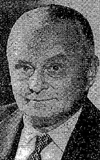 |
Alfred H. Morton ’19
Pioneering radio and television executive
Director – Voice of America
First full time Executive Director of Psi Upsilon Fraternity
Born in Chicago on October 5, 1897, Brother Alfred “Doc” Morton studied engineering at the University of Illinois, where he received his degree in 1919 after service in World War I. He later did graduate work at Columbia, after which he joined the General Electric Company as an assistant to Owen O. Young, who later became board chairman of General Electric and of R.C.A.
Mr. Morton took part in forming RCA in 1919 and in 1921 he moved to that comÂpany, opening and managing its first office in Washington. Three years later he returned to New York City as commercial manager of RCA Communications and in 1929 was named European manager for RCA at its headquarters in Paris.
He began the first broadcasts from the Continent to the United States, and the French Government made him a chevalier of the Legion of Honor for his contributions to French-American relations. The National Order of the Legion of Honor, founded by Napoleon Bonaparte, recognizes eminent service to the Republic of France. The Order has five ranks: Chevalier, Officier, Commandeur, Grand Officier, and Grand Croix. Recipients of this honor are named by decree signed by the President of the Republic.
Upon his return to the United States in 1935, he joined the National Broadcasting Company as manager of the program department and then became vice president of its radio stations. He added the title of vice president in charge of television when NBC began regular, program service.
With the outbreak of World War II, Mr. Morton became president of the National Concert and Artists Corporation. As NBC Artists Service, this had been a major NBC operating department. Early in 1942 the Department of Justice ordered NBC to divest itself of one of its two networks and its artists unit. NBC kept the Red Network. Its Blue Network became the American Broadcasting Company and the artists group became a new corporation with Mr. Morton as the head.
In 1952 at the height of the nation’s Red Scare, Brother Morton became the director of Voice of America, the State Department’s broadcasting service to listeners abroad. While in this position, Brother Morton went head to head with infamous Red-baiter, Senator Joseph McCarthy of Wisconsin, eventually leaving the position after fighting a public battle defending himself against Sen. McCarthy’s charges.
After he left the Voice of America, Mr. Morton formed Television Consultants, an orÂganization concerned with helping applicants for television-station ownership prepare license applications. By 1963, Psi Upsilon called Brother Morton to service, becoming its first full-time Executive Director in 1963. |














